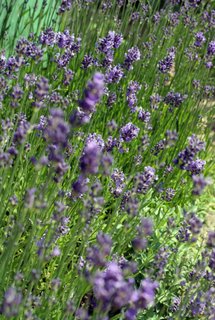Research published in the last two years shows that certain slow activities–like gentle yoga or gardening–can reduce your stress level and blood pressure and improve your body’s ability to regulate sugar. Past studies have shown that other habits like meditation can help reduce chronic pain and enhance mental clarity. The first step to finding “slowness”is to clear some room in your life–watch less TV or spend less time browsing at the mall. “Jettison the clutter that clogs up your schedule,” says Carl Honoré, author of In Praise of Slowness (HarperOne, 2004). “When you focus on the things that are important at work or at home you can enjoy those things more,”he says. You can also take a more relaxed approach to the things you already do and adopt new habits that require mindfulness. “It’s one thing to say you’re going to slow down, but a slow hobby helps you put those words into practice,” says Honoré. To get you started we’ve come up with seven ways to destress and reenergize.

gardening is a great mindfulness practice that cultivates stillness of mind
1. Become a Gardener
Caring for flowering plants may help you relax and get grounded. In 2004, researchers at Japan’s Utsunomiya University found repotting plants lowered fatigue and promoted physiological relaxation in study participants, and that working with flowers seemed to have a stronger positive effect than working with nonflowering plants.
HEALTH BENEFITS Research shows that exposure to plants–and even just looking at them–can reduce blood pressure, increase concentration and productivity, and help you recover from illness, says Andy Kaufman, Ph.D., assistant professor of tropical plant and soil sciences at the University of Hawaii in Honolulu. He cites a classic 1984 study, published in Science, which showed that even the view of a green garden helped surgical patients recovering from gall bladder surgery. Among a group of 46 patients in a Pennsylvania hospital, the 23 who had rooms with windows facing greenery had shorter postoperative stays and needed fewer pain–relieving analgesics than the 23 whose windows faced a brick wall.
GETTING STARTED If you live in an apartment or don’t have much room to garden, invest in the EarthBox (earthbox.com), a self–watering container garden that comes with potting soil and fertilizer. “Even if you have a brown thumb, you can grow things [in it],”says David Ellis, American Horticulture Society spokesperson. You could also join a community garden; visit ahs.org, the American Horticulture Society’s website, for more info.

yoga helps to slow us down
2. Practice Slow Yoga
Slow yoga emphasizes one drawn–out breath for each movement you make. Like tai chi, it uses many repetitive flowing moves. “When you practice slow yoga, you create more awareness between mind and body,”says Beth Shaw, founder of Yoga Fit Training Systems in Los Angeles. This creates a deep sense of stillness and helps develop patience and lower stress, she adds.
HEALTH BENEFITS Last year, researchers in Sweden and India showed that practicing yoga can reverse the negative effects of high blood pressure, obesity, and high blood sugar. The studies, published in the journal Diabetes Research and Clinical Practice, showed reduced waist circumference, blood pressure, blood sugar, and triglycerides (the chemical form of fat cells) and higher HDL (so–called good cholesterol) levels in a control group that practiced yoga versus a placebo group.
GETTING STARTED To find a Slow Yoga class near you visit yogafit.com or inquire at your local yoga studio. You might also consider restorative or yin yoga, two other gentle forms of the practice.

Take a nap
3. Take a Nap
You snooze, you win, according to a Harvard study published last year in The Archives of Internal Medicine. Researchers revealed that people who regularly napped at least three times a week for an average of 30 minutes had a 37 percent lower risk of heart attack than those who didn’t nap. “It shows that napping is an important preventive strategy just like regular exercise, eating right, and not smoking,”says Sara C. Mednick, Ph.D., author of Take a Nap! Change Your Life (Workman, 2006).
HEALTH BENEFITS A daily nap also boosts serotonin, says Mednick, which may lead to improved memory and performance. Napping can even contribute to weight loss, according to a study in the American Journal of Physiology, Endocrinology, and Metabolism in 2007. That study looked at hormone levels in 41 men and women who were part of a seven–day sleep–deprivation experiment. Those allowed to nap for two hours following a night without any sleep showed a significant drop in cortisol, a hormone related to high levels of stress, and a complement of growth hormone, which helps regulate insulin and fat storage. Researchers concluded that a midafternoon nap improves alertness and performance and reverses the negative metabolic effects of sleep loss.
GETTING STARTED The best time to nap is between 1 p.m. and 3 p.m., but a 15– to 20–minute power nap at any time can help. Set your Zen Alarm Clock for 20 minutes. Close the office door and take a snooze, or find a quiet place where you feel safe. Nap on weekends, Mednick says. “Just don’t use the weekend to catch up on sleep lost in the week.”Check with your doctor about napping if you’re being treated for insomnia.
4. Start a Slow Hobby

learning to paint
Hobbies that require mindful, solitary activity–such as knitting, painting, sculpting, crocheting, or quilting–can act as a brake on your hectic pace.
HEALTH BENEFITS “Slow hobbies help you cultivate the lost art of concentration and being in the moment. They have a meditative quality to them,”says author Carl Honorè. “And that calming effect goes beyond the act itself. Maintaining that inner stillness enables you to negotiate the fast–moving waters of the rest of your day.”
GETTING STARTED Sixty–four percent of people who knit or crochet say they use these crafts to help them reduce stress and relax, according to the Craft Yarn Council of America. Visit craftyarncouncil.com for information. To learn about drawing, visit drawspace.com. Check with a local college or community center for other craft classes.
5. Eat Slowly
Eating too fast creates stress in the body, says nutritionist Marc David, author of The Slow Down Diet (Healing Arts Press, 2005). That causes a spike in cortisol and insulin, which in turn diminishes your ability to burn calories and makes you more likely to gain weight. Eating quickly also leads to overeating. “The brain demands more food if it doesn’t have time to register its needs for taste, aroma, and satisfaction,”says David.
HEALTH BENEFITS Taking time to eat creates a relaxation response, which means you’ll have fewer digestive complaints and your body will be able to take in the nutrients it needs. Plus “we make better food choices, and we know when to stop,”he adds.
GETTING STARTED To ease the pace, double the time you spend on your meals; for example, if you usually eat breakfast in five minutes, stretch it out to ten. “Focus on your food: Taste it, enjoy it, notice it, savor it,”says David. “Find relaxed time between bites by slowing down your internal conversation. Let go of any sense of urgency, and allow the moment to be sensual.”The cooking process can help you slow down too, says David. “Instead of microwaving something, make a soup from scratch.”
6. Do One Thing at a Time
A lot of us believe we get more done by multitasking. But research at the University of Michigan published in the Journal of Experimental Psychology in 2001, shows the opposite is true. “If you concentrate on one task at a time, you get more done faster and make fewer mistakes,” says David E. Meyer, director of the Brain, Cognition, and Action Laboratory at the University of Michigan.
HEALTH BENEFITS Taking on chores one at a time reduces chronic stress and protects your short–term memory, which comes under fire if the brain is overtaxed.
GETTING STARTED To curb outside distractions and focus better, set aside time when you can concentrate on one activity from start to finish. For example, check e–mail once an hour and turn off your instant messaging; let your phone messages go to voice mail and only check them occasionally throughout the day.

practice meditation in order to slow down
7. Meditate
“Meditation teaches us to focus,”says Steven Hartman, director of professional training at the Kripalu Health and Yoga Center (kripalu.org) in Stockbridge, Mass. “All day your mind is chattering. When you meditate, you can hear your own inner wisdom.”
HEALTH BENEFITS Studies have shown that practicing meditation also improves blood pressure, fortifies the immune system, and promotes a sense of well–being. “A daily meditation practice can bring body, breath, mind, and spirit into balance,”says Hartman.
GETTING STARTED Check out a program like Transcendental Meditation. (See tm.org.) Or begin at home: “Put an egg timer on and stay with your breath for just two and a half minutes,”says Hartman. “Keep your spine tall and straight and allow the breath to be natural.”If you’re seated on the floor, a cushion can raise your pelvis and bring your spine into a natural position. As you get comfortable with the practice, you can increase your time to 15 or 30 minutes a day.
adapted from Natural Health Magazine, by Chrystle Fiedler
One of the ultimate Zen like experiences is waking-up from a great slumber refreshed and energized. Your mind and body are harmoniously one, both alert and focused. Having a refreshed mind and body are two keys to a natural and Zen lifestyle. Waking up in the morning should not be a loud and abrupt awakening, but rather it should be a peaceful positive experience. The right natural alarm clock can transition your deep and tranquil sleep into a serene start to consciousness. Imagine a long-resonating Tibetan bell-like chime waking you up to a beautiful morning experience.
The right alarm clock can be the most beneficial investment for you. With our Now & Zen natural alarm clock you are awakened more gradually and thus more naturally. Now & Zen is focused on creating a naturalistic lifestyle, and our clocks are an example of our philosophy.

Zen Meditation Timers with Soothing Chime
Now & Zen – Soothing Chime Alarm Clock & Timer Store
1638 Pearl Street
Boulder, CO 80302
(800) 779-6383
Posted in Chime Alarm Clocks, intention, Meditation Timers, Meditation Tools, mindfulness practice, Natural Awakening, Now & Zen Alarm Clocks, sleep, Sleep Habits, wake up alarm clock, Well-being, yoga, Yoga Timer, Yoga Timers by Now & Zen, Zen Alarm Clock, Zen Timers